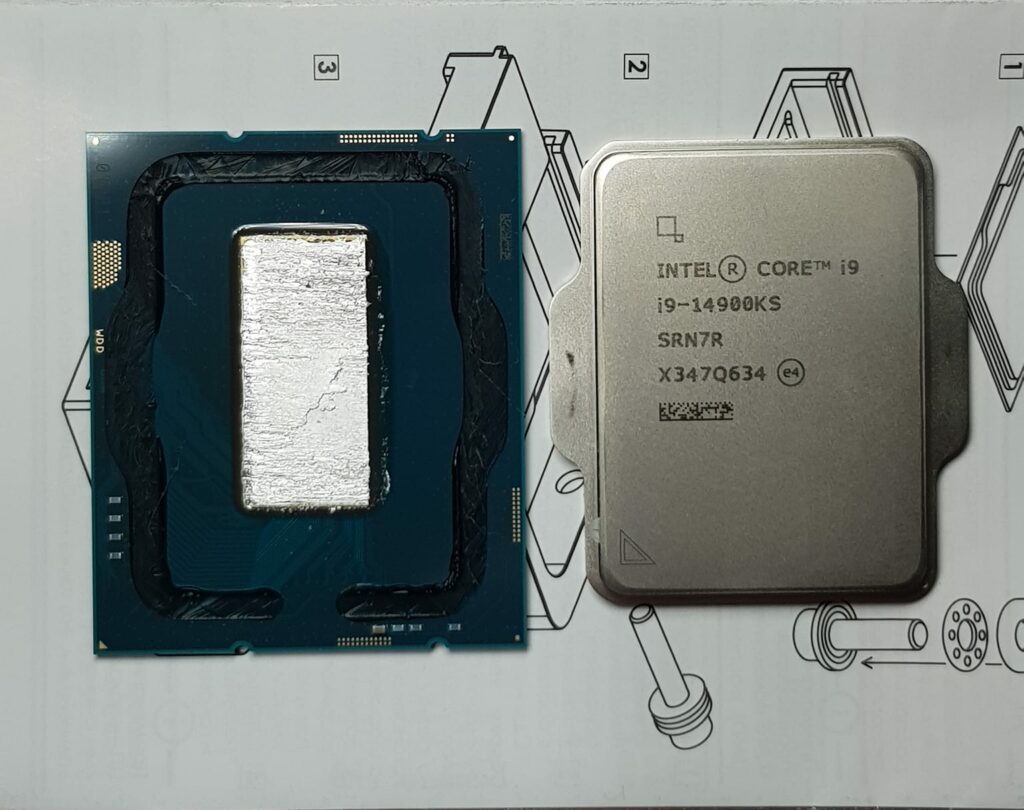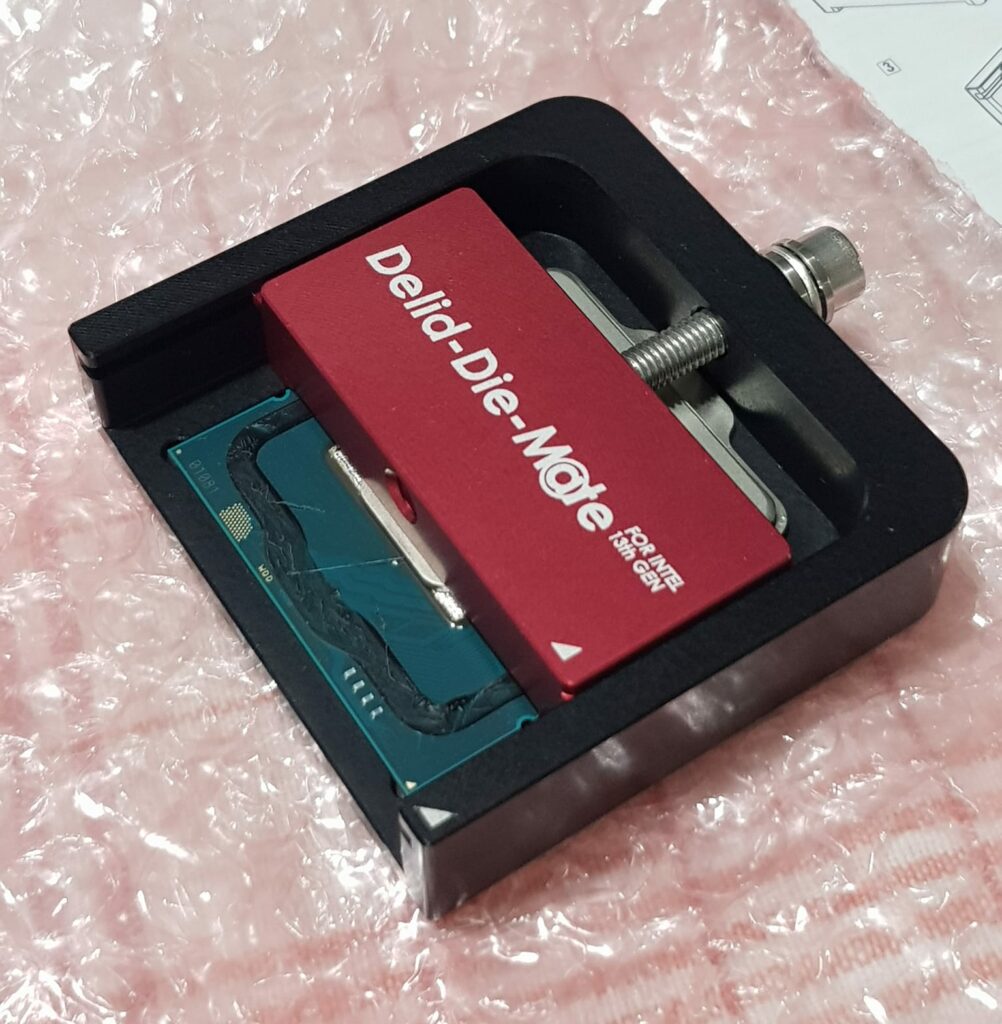- Enthusiasts delid their CPUs to decrease their processor’s temperatures significantly.
- You mainly require a delidding tool and metal liquid thermal paste to proceed.
- While delidding may lead to lower temperatures, if the CPU cooler’s heatsink doesn’t touch the IHS, the CPU’s temperatures may rise instantly.
- Delidding increases the possibilities for extreme overclocking but may cause instability issues.
I have been using a delid CPU for quite a while now, and I have to admit, I have mixed opinions about my experiments. While I saw impressive performance gains and thermal improvements, the instability made me doubt whether it was worth the effort. Aside from the initial delight from overclocking, the warranty concerns and sudden crashes raise the question of whether you should delid your CPU. Here’s my take on the topic.
Why Do People Delid Their CPUs?

Delidding a CPU is perhaps the most effective way to reduce temperatures and improve the processor’s overclocking capabilities. That’s also why I decided to delid my CPU: to achieve greater overclocks without thermal throttling the CPU. But what is delidding exactly?
Simply put, delidding involves removing the Integrated Heat Spreader (IHS) from the CPU to expose its actual die. The technique allows more efficient cooling because the CPU cooler directly touches the die rather than the IHS.
Many extreme overclockers often delid their CPUs to test the limits of their hardware; I wouldn’t consider the practice viable for average gamers.
The Skill And Tools Required For Delidding

Before explaining whether you should delid your CPU, let’s discuss the skills and tools you’ll need. Delidding, you see, isn’t an easy concept. Moreover, these delidding tools aren’t remarkably cheap, either. For example, the Delid Die Mate tool meant to delid Ryzen 7000 series processors costs a hefty ~$70.
Plus, the liquid metal thermal paste can also be quite costly. So, you may need a budget of up to $100 to delid your CPU. Of course, you’ll need a fair amount of skill to handle the CPU properly to avoid damage.
Even for me, I had to spend a few hours delidding and noting every minuscule detail to ensure there were no problems during the entire process. Therefore, I don’t recommend delidding your processor if you’re not familiar with computer hardware and don’t plan on extremely overclocking your PC.
How Delidding Affects Temperatures
Delidding a CPU is a double-edged sword. Sure, it helps reduce temperatures by a decent margin, but if not handled properly, you can expose your die, increasing the temperatures instead. Therefore, I don’t recommend experimenting with your CPU unless you’re using a decent AIO cooler.
Several methods of delidding affect temperatures. For example, many people replace the thermal paste inside the IHS after delidding the CPU with liquid metal and then put the IHS back to help reduce temperatures without damaging the processor. This practice usually allows you to see a 10 — 20°C difference, depending on the CPU.
Stability And Overclocking
The most common reason to delid a CPU is to achieve higher overclocked boost clocks and see how much it can be pushed. Moreover, as I stated earlier, delidding provides incredible overclocking headroom. However, doing so also comes with various risks and stability issues.
To explain, when using my delid CPU, I constantly changed the voltages to keep my PC from crashing. Doing so also affected my overclocking experience. The likely reason for the instability could be slight damage while delidding the processor. To avoid having issues after delidding your CPU, here’s a tutorial on how to delid a CPU by ASUS ROG.
Weighing The Pros And Cons
In conclusion, delidding is a risky and tricky process that is not meant for everyone. While the process can bring decent performance gains and thermal drops, a single mistake can severely damage your CPU. Not to mention, delidding a processor instantly voids its warranty, so you can’t take it to the manufacturer, either.
On the other hand, if you’re an experienced enthusiast who knows how to handle computer hardware and you want to push the limits of your PC components, delidding can be quite an adventure. For most users, though, the risks far outweigh the benefits, and I don’t recommend delidding your CPU unless you want to get into extreme overclocking.
Thank you! Please share your positive feedback. 🔋
How could we improve this post? Please Help us. 😔
[Hardware Expert]
With a major in Computer Science, Sameed is a tech enthusiast who puts his passion for gadgets into words and creates informative blogs. From comparing different hardware to reviewing the best RAMs, motherboards, and graphics cards for your next build, Sameed has covered a wide spectrum of topics that have given him a special insight into every nook and cranny of the tech world. Sameed is also a certified expert at Computer Hardware & Networking.
Get In Touch: sameed@tech4gamers.com




